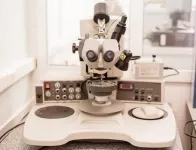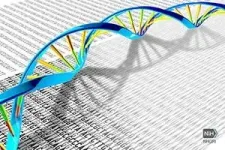INFORMATION:
Reference article
Prats A, Sayols-Baixeras S, Fernández-Sanlés A, Subirana I, Carreras-Torres R, Vilahur G, Civeira F, Marrugat J, Fitó M, Hernáez A*, Elosua R*. High-density lipoprotein characteristics and coronary artery disease: a Mendelian randomization study. Metabolism. 2020 Sep 4;112:154351. doi: 10.1016/j.metabol.2020.154351. Epub ahead of print. PMID: 32891675.
Not all "good" cholesterol is healthy
The work shows that people with large HDL particles have an increased risk of myocardial infarction, while only small HDL particles are actually associated with decreased risk
2021-02-26
(Press-News.org) HDL cholesterol (high-density lipoprotein cholesterol) or good cholesterol is associated with a decreased risk of cardiovascular disease as it transports cholesterol deposited in the arteries to the liver to be eliminated. This contrasts with the so-called bad cholesterol, LDL (low-density lipoprotein cholesterol), which causes cholesterol to accumulate in the arteries and increases cardiovascular risk. Although drugs that lower bad cholesterol reduce cardiovascular risk, those that raise good cholesterol have not proven effective in reducing the risk of heart disease. This paradox has called into question the relationship between good cholesterol and cardiovascular risk, and researchers are now studying the characteristics of these HDL or good cholesterol particles.
A study led by the Hospital del Mar Medical Research Institute (IMIM), published in the journal Metabolism, Clinical and Experimental, has now demonstrated that not all good cholesterol is healthy. Researchers from the CIBER on Cardiovascular Diseases (CIBERCV), the CIBER on Obesity and Nutrition (CIBEROBN), and the CIBER on Epidemiology and Public Health (CIBERESP), as well as others from Hospital Clínic-IDIBAPS, IDIBELL, the Hospital de la Santa Creu i Sant Pau Research Institute, and the Hospital Clínico Universitario in Zaragoza also took part in this study.
In the work, the researchers analysed genetic characteristics that determine the size of good cholesterol particles, and then studied their relationship with the risk of myocardial infarction. The conclusion is that genetic characteristics linked to the generation of large good cholesterol particles are directly associated with a higher risk of heart attack, while features linked to small good cholesterol particles are related to a lower risk of heart attack. "There is a positive causal relationship between the size of HDL cholesterol particles and the risk of heart attack, so although we have to increase the levels of good cholesterol in the blood, they must always be small particles", explains the study's principal investigator, Dr. Robert Elosua, a researcher at the Hospital del Mar-IMIM, CIBERCV, and the University of Vic-Central University of Catalonia (UVic-UCC).
The good cholesterol particles are more effective in transferring cholesterol to the liver so that it can be eliminated. "If we need to do something in relation to HDL, it is to increase the number of small particles, which are those that adequately perform the function of eliminating cholesterol, those that really move it to the liver for removal, and do not allow it to accumulate in the arteries and cause cardiovascular disease", says Dr. Álvaro Hernáez, a IDIBAPS and CIBEROBN researcher.
Currently, there are no drugs that increase good cholesterol levels and reduce the risk of cardiovascular disease. "This study highlights new and potential therapeutic targets in the field of cardiovascular diseases, including several genes related to the qualitative aspects of HDL particles, which may contribute to cardiovascular prevention", concludes Dr. Albert Prats, a researcher in the Epidemiology and Cardiovascular Genetics Research Group at the Hospital del Mar-IMIM and first author of the study.
ELSE PRESS RELEASES FROM THIS DATE:
Embed germ defence behaviours at home to reduce virus spread now and in the future - new study
2021-02-26
Whilst the nation has taken to washing its hands regularly since the start of the pandemic, other individual behaviours, such as cleaning and disinfecting surfaces or social distancing within the home, have proved harder to stick, say the researchers behind the behaviour change website 'Germ Defence'.
In their new study, published today (Friday 26 February 2021) in the Journal of Medical Internet Research, psychologists from the universities of Bath, Bristol and Southampton, warn of the continuing risks of household transmission of COVID-19 and the ongoing importance of breaking chains of transmission now and in the future.
Their research analysed user data of the ...
Arthritis drugs may reduce mortality and time in ICU for sickest COVID patients
2021-02-26
Treating critically ill COVID-19 patients with drugs typically used for rheumatoid arthritis may significantly improve survival, a landmark study has found.
The findings, which were announced in January and have now been peer-reviewed and published in the New England Journal of Medicine, come from the REMAP-CAP trial, which evaluates the effect of treatments on a combination of survival and length of time patients need support in an intensive care unit (ICU).
Initial findings reported in November showed that tocilizumab, a drug used to treat arthritis, was likely to improve outcomes among critically ill COVID-19 ...
New machine learning tool facilitates analysis of health information, clinical forecasting
2021-02-25
Clinical research requires that data be mined for insights. Machine learning, which develops algorithms to find patterns, has difficulty doing this with data related to health records because this type of information is neither static nor regularly collected. A new study developed a transparent and reproducible machine learning tool to facilitate analysis of health information. The tool can be used in clinical forecasting, which can predict trends as well as outcomes in individual patients.
The study, by a researcher at Carnegie Mellon University (CMU), appears in Proceedings of Machine Learning Research.
"Temporal Learning Lite, or TL-Lite, is a visualization and forecasting tool to ...
Scientists investigated more thoroughly Walker breakdown in 3D magnetic nanowires
2021-02-25
Physicists from Russia, Chile, Brazil, Spain, and the UK, have studied how the magnetic properties change in 3D nanowires, promising materials for various magnetic applications, depending on the shape of their cross-section. Particularly, they more deeply probed into the Walker breakdown phenomenon, on the understanding of which the success of the implementation of the future electronics devices depends. The research outcome appears in Scientific Reports.
The cross-sectional geometry of a three-dimensional nanowire affects the domain wall dynamics and therefore is crucial for their control. In turn, managing the DW dynamics under various external conditions is necessary in order to realize the future electronics and computing devices, operating on new physical principles. ...
A tangled food web
2021-02-25
Born in food web ecology, the concept of trophic levels -- the hierarchy of who eats who in the natural world -- is an elegant way to understand how biomass and energy move through a natural system. It's only natural that the idea found its way into the realm of aquaculture, where marine and freshwater farmers try to maximize their product with efficient inputs.
"It's often used as a measure of how sustainable it is to harvest or consume that species," said Rich Cottrell(link is external), a postdoctoral researcher at UC Santa Barbara's National Center for Ecological Analysis & Synthesis (NCEAS). As plants (level 1) become food to plant eaters (level 2), who in turn are consumed by carnivores (level 3) and so on, the amount of energy ...
Identifying patient-specific differences to treat HCM with precision medicine
2021-02-25
Hypertrophic cardiomyopathy (HCM) is a cardiovascular disease characterized by thickening of the left ventricle, otherwise known as the main squeezing chamber of the heart. HCM is best known for causing sudden death in athletes but can occur in persons of any age, often without symptoms. While frequently discussed in the context of genetics, most patients with HCM do not have a known genetic variant. Investigators from Brigham and Women's Hospital uncovered a means to study the complexity of this disease beyond the identification of individual genes. This new approach offers a path toward treating HCM using individualized medicine. ...
Nuclear physicists on the hunt for squeezed protons
2021-02-25
While protons populate the nucleus of every atom in the universe, sometimes they can be squeezed into a smaller size and slip out of the nucleus for a romp on their own. Observing these squeezed protons may offer unique insights into the particles that build our universe.
Now, researchers hunting for these squeezed protons at the U.S. Department of Energy's Thomas Jefferson National Accelerator Facility have come up empty handed, suggesting there's more to the phenomenon than first thought. The result was recently published in Physical Review Letters.
"We were looking to squeeze the proton such that its quarks are in a small-size configuration. And that's a pretty tough ...
OU study highlights need for improving methane emission database
2021-02-25
A University of Oklahoma-led study published in 2020 revealed that both area and plant growth of paddy rice is significantly related to the spatial-temporal dynamics of atmospheric methane concentration in monsoon Asia, where 87% of the world's paddy rice fields are situated. Now, the same international research team has released a follow-up discussion paper in the journal Nature Communications. In this paper, the team identifies the limits and insufficiency of the major greenhouse emission database (EDGAR) in estimating paddy rice methane emissions.
"Methane emission from paddy ...
UTEP survey reveals hidden health and wellness benefits of COVID-19 pandemic
2021-02-25
EL PASO, Texas - A study by physiology researchers at The University of Texas at El Paso found that El Paso's stay-at-home ordinance due to the COVID-19 pandemic had positive effects on the health and well-being of the region's residents.
Despite a shutdown of gyms and movement restrictions on non-essential activities, residents increased their fitness activity and closely monitored their food and nutrition intake, said Cory M. Smith, Ph.D., assistant professor of kinesiology in UTEP's College of Health Sciences and the study's principal investigator.
More than 1,300 El Paso and ...
Landmark study details sequencing of 64 full human genomes to better capture genetic diversity
2021-02-25
Researchers at the University of Maryland School of Medicine (UMSOM) co-authored a study, published today in the journal Science, that details the sequencing of 64 full human genomes. This reference data includes individuals from around the world and better captures the genetic diversity of the human species. Among other applications, the work will enable population-specific studies on genetic predispositions to human diseases as well as the discovery of more complex forms of genetic variation.
Twenty years ago this month, the International Human Genome Sequencing Consortium announced the first draft of the human genome reference sequence. The Human Genome Project, as it was called, required 11 years of work and involved more than 1000 ...
LAST 30 PRESS RELEASES:
Measuring the expansion of the universe with cosmic fireworks
How horses whinny: Whistling while singing
US newborn hepatitis B virus vaccination rates
When influencers raise a glass, young viewers want to join them
Exposure to alcohol-related social media content and desire to drink among young adults
Access to dialysis facilities in socioeconomically advantaged and disadvantaged communities
Dietary patterns and indicators of cognitive function
New study shows dry powder inhalers can improve patient outcomes and lower environmental impact
Plant hormone therapy could improve global food security
A new Johns Hopkins Medicine study finds sex and menopause-based differences in presentation of early Lyme disease
Students run ‘bee hotels’ across Canada - DNA reveals who’s checking in
SwRI grows capacity to support manufacture of antidotes to combat nerve agent, pesticide exposure in the U.S.
University of Miami business technology department ranked No. 1 in the nation for research productivity
Researchers build ultra-efficient optical sensors shrinking light to a chip
Why laws named after tragedies win public support
Missing geomagnetic reversals in the geomagnetic reversal history
EPA criminal sanctions align with a county’s wealth, not pollution
“Instead of humans, robots”: fully automated catalyst testing technology developed
Lehigh and Rice universities partner with global industry leaders to revolutionize catastrophe modeling
Engineers sharpen gene-editing tools to target cystic fibrosis
Pets can help older adults’ health & well-being, but may strain budgets too
First evidence of WHO ‘critical priority’ fungal pathogen becoming more deadly when co-infected with tuberculosis
World-first safety guide for public use of AI health chatbots
Women may face heart attack risk with a lower plaque level than men
Proximity to nuclear power plants associated with increased cancer mortality
Women’s risk of major cardiac events emerges at lower coronary plaque burden compared to men
Peatland lakes in the Congo Basin release carbon that is thousands of years old
Breadcrumbs lead to fossil free production of everyday goods
New computation method for climate extremes: Researchers at the University of Graz reveal tenfold increase of heat over Europe
Does mental health affect mortality risk in adults with cancer?
[Press-News.org] Not all "good" cholesterol is healthyThe work shows that people with large HDL particles have an increased risk of myocardial infarction, while only small HDL particles are actually associated with decreased risk



